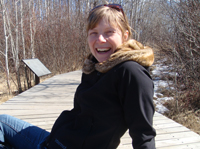
"I'm a student of land," writes EFS Professor Sarah Krotz, an expert in an emerging scholarly discipline she calls "geocriticism." "And I'm fascinated by maps. The lines on them. The names. The way they encode stories. I'm trying to understand the power of mapping. I'm trying to trace through literature the workings of the geographical imagination."
Sarah Krotz brings a world of know-how to this rapidly growing, and globalizing, new academic discipline. "I grew up canoe tripping," she explains. "For a while I worked summers as a canoe-trip camp counsellor, taking teenagers out on long trips through Northern Ontario. We'd be traveling to places I'd never seen, and so I'd spend entire days in the Dalhousie University map library, trying to puzzle out routes through this incredible network of rivers and lakes. We needed to find routes that would begin and end on a road. Routes that would take us exactly 42 days, that would make teenagers happy, that would teach them something. Maps began for me as instruments, but that's when I fell in love with them. I found myself fascinated by maps as aesthetic objects. I got lost in their imaginative topography. I wanted to know more about the stories they encoded - in the names, in the erasures, in the spaces between the lines."
Professor Krotz's own journey into geocriticism runs through Canadian literature of the "long nineteenth-century." What resonates for her first and foremost is that literature's immediacy in the encounter with land. "These writers are trying to situate spaces that are in transition. Spaces under negotiation. Contested spaces. They're grappling with spaces that demand that they adapt to something new - some other way of thinking - but they don't always know how. They're trying to place themselves within a place that's changing by their very act of being there. The geography isn't just background to their stories. It's an active participant in the story-making. It encodes stories within their narratives that they might not even know they're in the process of telling."
Krotz situates geocriticism as part of a larger shift now taking place in social thought across the humanities and social sciences, one she calls "the spatial turn." Her own scholarly interests cut across Canadian, postcolonial, and Aboriginal literature studies, topography, literary cartography, eco-criticism, and nature writing, but what guides her own passage through these disciplines is a desire to understand a deep complexity that lives within Canadian nineteenth-century documentary literature. On the one hand, Krotz explains, this is literature that participates actively in cognitive colonization - literature that defines Canadian spaces as an extension of British landscape. On the other hand, this is literature that proves, on examination, to be layered with overlapping narratives, ones that speak otherwise to the social dominant, and to each other. They're like maps themselves. "You never actually get to the landscape in this literature," Krotz explains. "You dig down and you find beneath one layer of imaginative mapping an anterior map, a pre-existing idea of what the landscape is and what it means. That's one of the ways that alternative forms of knowledge enter into the historical record."
As Krotz sees it, this layering of other ways of knowing in the literature of mapping matters not just for historians of Canada or students of literature, but for today's political landscape. "It's easy to overlook these traces of negotiation in early Canadian cognitive mapping," says Krotz. "It's easy to feel superior to these historical figures - they so often just get it wrong. But we live with the legacies of their geographical imaginations." And the problems they are grappling with are problems we have yet to solve. "We know now that we are seriously endangering sustainable life on this planet," she points out by way of example. "But we don't change what we do. We're not so different from those nineteenth-century settlers who came to Canada as part of a larger social project, who displaced other peoples, who appropriated their land... all the while feeling conflicted in so many ways."
At the same time, there can be startlingly fresh ideas in this writing. "Some of these early writers anticipate our current language about ecology and our relationship with the natural world," she notes. "Part of what they recorded was a need to leave room for an interconnective relationship with place. I want my students to see the complex humanity in their writing. I want them to see that there are all kinds of ways in which fiction comes into the map, all kinds of ways in which a geographical imagination underwrites fiction. I want them to see how mapping resists the collapse of cultural memory. I want them to see how the map reveals the erasures that fiction so often tries to perform."